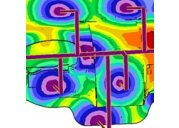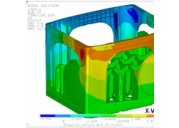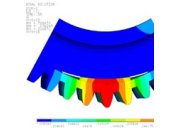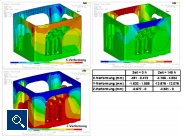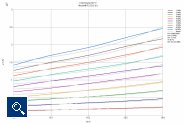Simulation of creep
Taking appropriate account of creep behavior
During life time operation a component is exposed to various temperatures and loads. These criteria, especially long-term stresses, sometimes influence the design of a moulded part to a considerable extent. The creep behavior of the material used, i.e. the time and temperature-dependent, plastic deformation under stress must be taken into account during the calculation.
The creep modulus
The Young's-modulus is used in the design to describe the deformation behavior of materials. Due to the fact that plastics demonstrate viscoelastic material behavior the Young's modulus changes depending on the stress period and the temperature. You can calculate a modulus using the isochronic stress strain diagram in a similar way to the method employed with the stress strain diagram of the tensile test which becomes lower in line with increasing stress period, temperature and strain and thus describes the creeping of the material. This modulus is called the creep modul Ec
Moderated Young's - modulus or material laws
In many cases the calculation of long-term stresses is only executed choosing a lowered Young's modulus according to the load duration and temperature given. However, this simplified procedure can only provide a rough estimate of the component shape retention. In reality stress distribution is present in the component. This leads to locally varied aging and thus to a variation of the creep modulus throughout the part. In the calculation the engineers of the plastics simulation center take account of this by using appropriate material models such as the Bailey-Norton Law.
Plastics simulation center
- Selects the appropriate material laws, calibrates them and calculates the long-term deformation behavior
- Measurement of the material coefficients if these are not present
Examples
- Fanwheels under the influence of long-term centrifugal stress
- Crates and other transport containers under a long-term stacked loads
- Long-term loaded plastic springs
- Long-term loaded hybrid components
As a specialist for the simulation of injection moulding processes and component stresses Impetus Plastics Engineering has so far demonstrated its expertise in hundreds of projects. The calculation of component variants, FEM simulations of load conditions, deformation situations and failure modes, structural analyses of glass fibre reinforced injection moulded parts as well as anisotropy tests can be found in the service portfolio.
